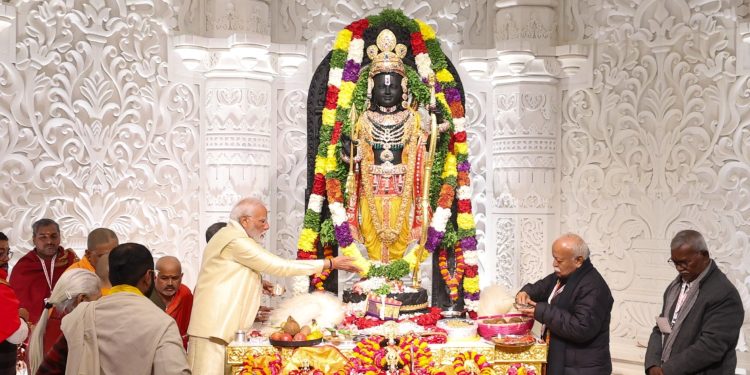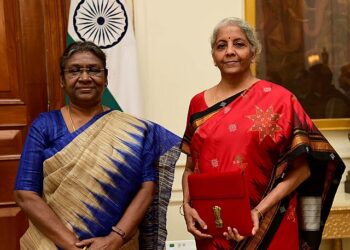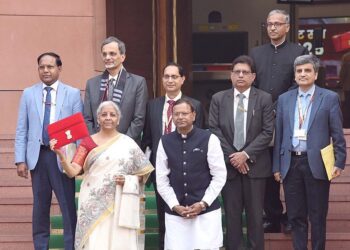The consecration of the Ram Temple in Ayodhya sparked celebrations worldwide, uniting joyous Ram devotees and Indian diaspora members in various events. Leaders from different nations extended congratulations to Prime Minister Narendra Modi for this historic occasion.
Internationally, Nepal’s Foreign Affairs Minister, Narayan Prakash Saud, commended PM Modi, highlighting the cultural connection between India and Nepal. In New York’s Times Square, Indian diaspora members gathered for prayers and cultural events, with the NASDAQ screen featuring images of the Ram Temple. SV Lotus Temple in Virginia hosted a diverse celebration, drawing attendees from Sikh, Muslim, and Pakistani American communities. A car rally with 1,000 participants took place in Los Angeles, showcasing the enthusiasm of the local Indian diaspora.
Trinidad and Tobago witnessed a grand event with over 5,000 attendees, including cultural performances dedicated to Lord Ram. In Australia’s Canberra, the Indian diaspora gathered for a live stream of the consecration ceremony. The UK saw car rallies, community celebrations, and cultural events, with temples organizing langars and distributing laddoos.
Global leaders, including Mauritius’ Prime Minister Pravind Kumar Jugnauth and Sri Lanka’s Namal Rajapaksa, extended warm regards to PM Modi. Special events unfolded in Mexico, where Queretaro inaugurated its first Lord Ram temple, and Dubai’s Indian community celebrated with traditional dances and devotional songs. Fiji marked the consecration with the Ram Lalla Utsav, organized by the Indian Council for Cultural Relations and Shree Sanatan Dharm Pratinidhi Sabha.
These celebrations showcased the global impact of the Ayodhya Ram Temple consecration, fostering unity among diverse communities and strengthening cultural ties within the Indian diaspora worldwide.
Indian Diaspora Organizations Criticize Ayodhya Ram Temple Inauguration
A joint statement from 22 Indian diaspora organizations has raised concerns over the inauguration of the Ayodhya Ram Temple in India, calling it a “dangerous precedent.” The statement, issued on January 22, emphasizes that the event, led by Prime Minister Narendra Modi, signals the ruling Bharatiya Janata Party’s (BJP) focus on Hindutva, the ideology promoting Hindu nationalism, in the upcoming general elections.
The organizations express worry about the temple’s construction on the site where the Babri Masjid Mosque stood before being demolished by Hindu nationalists in 1992. The Supreme Court’s 2019 ruling favored Hindu claims to the land, leading to the temple’s construction. The statement criticizes this as erasing Muslim heritage and accuses the BJP of attempting to make India a Hindu Rashtra (state) and replace the secular constitution.
The joint statement highlights increasing discrimination against religious minorities, particularly Muslims, and accuses the BJP of rewriting history and portraying Muslims as having no ties to India. Hindu nationalist groups are also accused of appropriating Muslim religious sites, with legal claims against mosques in Varanasi and Mathura.
The organizations argue that the temple’s inauguration, just before the general elections, signifies the BJP’s disregard for religious minorities’ rights in India. They claim it sets a dangerous precedent, further appropriating minority cultural and religious heritage and undermining their rights as Indian citizens.
Critics also argue that the temple’s consecration politicizes a religious event and challenges the principle of the state maintaining a “principled distance” from religion, as outlined in India’s foundation as a secular nation.
In addition to diaspora concerns, progressive voices within India and in countries like Australia and New Zealand condemn the event as a symbol of divisive Hindu nationalism. They call on lawmakers and civil society to acknowledge the violence associated with the temple’s construction and express solidarity with those who view it as a day of tragic remembrance.
Signatories to these statements include various diaspora organizations such as South Asia Justice Campaign, Hindus for Human Rights, and the Aotearoa Alliance of Progressive Indians, among others.
Australia and New Zealand Indian Diaspora Organizations Criticize Ayodhya Ram Temple Inauguration, Express Solidarity with Victims of Violence
Indian diaspora organizations in Australia and New Zealand have criticized the inauguration of the Ayodhya Ram Temple in a joint statement, calling it a divisive symbol of Hindu nationalism. The statement, issued on January 22, condemns the weaponization of Hindu faith for political gain and urges acknowledgment of the violence associated with the temple’s construction.
The Ram Temple is being built on the site of the demolished Babri Masjid Mosque, a contentious holy site in India. The Supreme Court’s 2019 ruling supported Hindu claims to the land, leading to the construction of the temple. The statement emphasizes the need for democratic principles and expresses concern that the event threatens the cohesion within multicultural communities.
Signatories to the statement include Hindus for Human Rights Australia and New Zealand (HfHR-ANZ), advocating for human rights and pluralism, and the Aotearoa Alliance of Progressive Indians, a collective committed to progressive values in New Zealand.
The Humanism Project, a secular social justice advocacy group in Australia, also joins the statement. They call for solidarity with those within the Indian diaspora, especially Muslims, for whom the event marks a day of tragic remembrance and symbolizes polarizing Hindu nationalism.
These diaspora groups highlight the importance of acknowledging the violence associated with the temple’s construction and call on lawmakers and civil society in Australia and New Zealand to uphold democratic principles and foster cohesion within multicultural communities.











